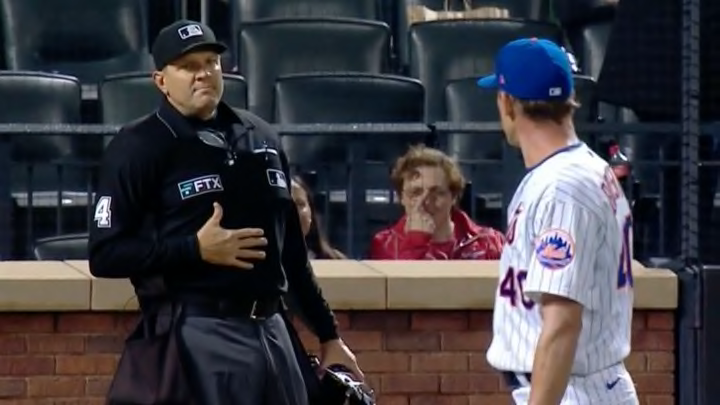Human Error Isn't a Baseball Flaw, It's a Feature
By Kyle Koster

Chris Bassitt froze Dansby Swanson with a gorgeous, perfectly located fastball to strike him out last night. From his position behind home plate, umpire Chad Fairchild somehow misread it and ruled a ball. A pitcher's jubilance and swagger melted into amazement and frustration. After walking halfway to the first-base line thinking his work was done, the tall right-hander shuffled back to the hill and eventually recored the third out without incident or further damage.
As between-innings entertainment sprung into place, Bassitt and Fairchild shared a brief interaction in which both apologized.
“I knew it was a strike, but at the same time, I think umpires, they have one of the hardest jobs in the world,” Bassitt said. “I have no problem if an umpire misses a call. That happens. But especially if an umpire just accepts that, well, what am I going to say? It is what it is. I say all the time that it was a strike, and then I go back and look at it, and they’re right. So I ain’t going to be mad at no umpire, I’ll tell you that. He said he was wrong. I said I was wrong. I was like, ‘All right. Let’s move on.’”
The moment is trending and serving as the muse for blog posts. When, in reality, it is utterly unremarkable. The truth, of course, is that such differences of opinion are woven into the fabric of the game. And they add to the complexity without detracting. Making the reactionaries who want to take a machete to a mosquito both wrong and misguided. Because the push for robot umpires, for all the good it believes it is accomplishing, is rooted in a fundamental misunderstanding of the sport of baseball, what it is, and what it is not.
Baseball is a game played by human beings and officiated by human beings. It's a game of errors and imperfection. Of rough edges and managing expectations. Pitching, at once one of the most solitary endeavors in all of sports, also requires fostering a working relationship with the person calling balls and strikes. The job of establishing the canvas upon which to paint is sometimes messy, and never without some push and pull.
Perhaps when the machines usurp yet more control and all decisions are outsourced to cold artificial intelligence, a uniform strike zone will change the sport for the better. But even if that concession is made — and it's a big one considering the lack of evidence to this point and the undeniable damage of eliminating the artistry and importance of the catcher —we will lose that fabric. And maybe it's not important to you. It is to me, and so many others who don't need a flawless and disconnected ecosystem in which to enjoy the game.
Baseball has always been about adaptation. And a neutral party trying their level best to preserve the integrity of the game. To foster a fair environment. The umpire does this not because they don't want to get yelled at or raked across social media coals. Those are concerns far less important than the main motivating factor.
Which is to do justice by the game. Because that is the calling. A calling any umpire knows they can never fulfill. But maybe, just maybe, the pursuit of that perfection is more meaningful than the computerized version of utopia. Maybe it's about the journey and not the destination.
All over sports we see changes being implemented to satiate viewing audiences, gamblers, and the squeakiest, most unimaginative minds with WiFi access. Progress is essential and reinvention is required. So perhaps the Bassitt-Fairchild detente means nothing to you. It meant something to them, though, and that shared field of respect fostered a very human moment. Baseball should be careful and judicious in balancing that beautiful, complicated and sometimes aggravating corner of the sport. Because there should always be a place for it.